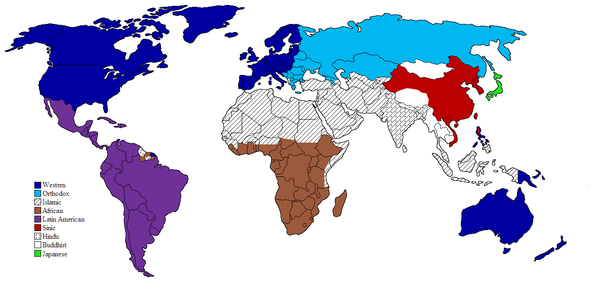Saturday, July 27, 2013
The Clash of Civilizations
"The Clash of Civilizations and the Remaking of World Order" is Samuel Huntington's 1996 best-seller book that provoked much debates among political analysts, economists, and anthropologists since the lecture he gave in 1992 at the American Enterprise Institute, followed by a 1993 Foreign Affairs article titled "Clash of Civilizations?" in which he responded to Francis Fukuyama's 1992 book "The End of History and the Last Man."
Huntington's thesis in the book is that future conflicts will be driven by cultural and religious motives rather than ideologies. He identifies 8 civilizations (shown in the world map) that may well clash and thus increase the probability of wars in order to remake the world order after the Cold War which had just ended.
1. Western:
2. Orthodox Christianity:
3. Islamic Countries:
4. African Countries:
5. Latin Americas:
6. Sinic (China, Japan):
7. Hindu (India)
8: Buddhist:
Huntington identified Islam as the most dangerous threat to Western civilization. Most historians of the late 20th century wrote about the revival of Islamic militants including the Ayatollahs of Iran since 1979, terrorist groups in Lebanon and Syria known as Hizbullah, the increasing destabilization of the Philippines by the independence mind of Abu Sayyaf and his Islamic militant group in the Philippines, the creation of the terrorist group Hamas in the Palestinian "Intifada" by 1989, the islamisation of the Sudan by such radical Islamists as Omar Al-Bashir from 1989 and more. However Huntington outlines the historic rivalry of Islam with Christianity since the Islamic conquests in the 7th century. "Globally nineteen of twenty-eight fault line conflicts in the mid-1990s between Muslims and non-Muslims were between Muslims and Christians." Huntington says (P. 212). He quotes Bernard Lewis, a leading Western scholar of Islam, who in his 1990 book "The Root of Muslim Rage" concluded: "It should now be clear that we are facing a mood and movement far transcending the level of issues and policies and the governments that pursue them. This is no less than a clash of civilizations - that perhaps irrational but surely historic reaction of an ancient rival against our Judeo-Christian heritage, our secular present, and the worldwide expansion of both. It is crucially that we on our side should not be provoked into an equally historic but also equally irrational reaction against that rival."
In 2001, Huntington's fears materialized in the 9/11 Islamist terrorist attack at the heart of America.
Seventeen years later, the fears of Huntington seem to be growing and materializing. First China is a vast economic power that still maintains a Communist central governing body although it borrowed technological power from America and allowed capital free market to grow. China has a vast industry and the highest growing economy in the world. Chinese cheap products allow its industries to export to the entire world and to be present in Africa more than other world powers. Militarily China threatens Japan and India, but above all corruption reigns in government-controlled dictatorship and its record of human rights is dismal. Second, Putin's Russia is becoming an empire as one of the fastest growth economies in the globe. Its arsenal of armies and nuclear weapons is huge but most importantly Russia is playing a vital role in the politics of current regional conflicts especially in its extensive military support of Syria against militant Islamists, and its challenge to the United States on the U.S. National Security Agency massive surveillance spying scandals revealed by Edward Snowden, who had access to NSA secret files and escaped to Russia a few months ago. The global most revealing events are related to the "Arab Spring" - a political movement in the Arab world that, according to the political analyst Mohammed Hassanein Heikal, was planned by the U.S. and its allies in NATO with the Muslim Brotherhood and implemented in 2011 and beyond to secure the ultimate solution for the Palestinian Question by replacing semi-secular governments with Islamic governments. When the revolutions started in January 2011 in Tunisia followed by Egypt and Yemen and later attempted in isolated spots in Syria, the popular will was about freedom from dictatorship, enhanced services to alleviate poverty, help the middle and poor classes cope with increased cost of living, and usher a democratic atmosphere where people can live and earn their living with justice and dignity. The elected Islamic governments have been failing to garner enduring popular support in spite of America's Barack Obama's support. According to Heikal, the Islamist government in Egypt failed on all accounts within one year since the election of the president: dictatorial decrees by Islamist President Mohammed Morsi against the independence of courts; excluding Christians and women from participation in open dialogue; forcing a constitution down the throat of Egyptians; and allying Egypt with terrorist organizations that threatened its division. On June 30, 2013, millions of Egyptians marched in Cairo and other cities demanding the resignation of Morsi and early presidential elections. When Morsi refused to resign, the Egyptian army, in support of the will of the people, removed Morsi from power on July 3.
Subscribe to:
Post Comments (Atom)
Today's Quote
"Behold I make all things new." (Revelation 21:5)
Websites
See Links to Websites Below



No comments:
Post a Comment